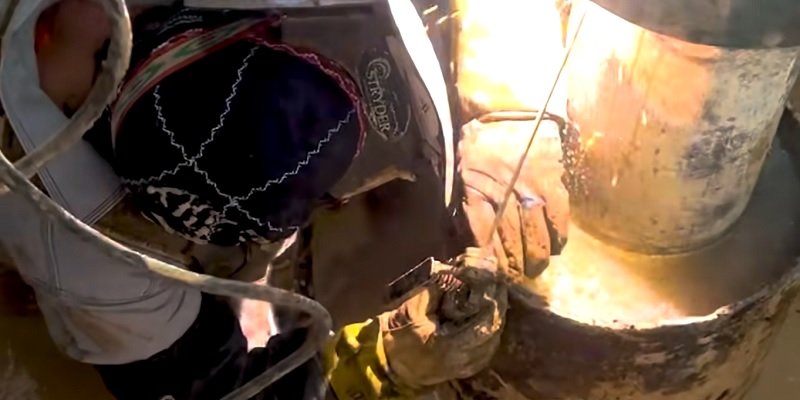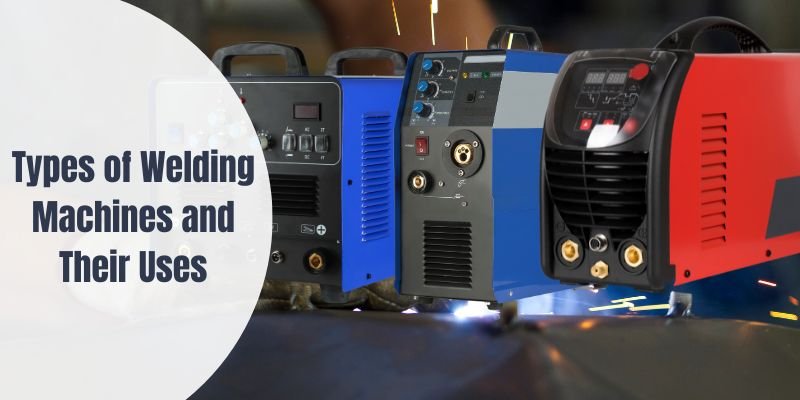Disclosure: This post contains affiliate links and I will be compensated if you make a purchase after clicking through my links. Learn More
A rig welder is a professional who performs welding tasks on oil rigs, offshore platforms, or other large-scale industrial projects. They are responsible for joining metal components using various welding techniques such as arc welding, gas welding, or flux-cored welding.
Rig welders play a crucial role in ensuring the structural integrity and safety of the rig or platform by creating strong, durable welds that can withstand harsh environmental conditions. Additionally, they may also perform maintenance and repair work on existing welds or equipment.
These skilled welders require expertise in interpreting blueprints, operating welding equipment, and adhering to strict safety protocols. Overall, rig welders are essential for the construction and maintenance of critical infrastructure in the oil and gas industry.

What Does A Rig Welder Do?
A rig welder is a skilled professional who specializes in welding tasks on oil rigs, construction sites, and other industrial sites. They play a crucial role in a wide range of industries, including oil and gas, manufacturing, infrastructure development, and more.
Job Responsibilities of a Rig Welder
As a rig welder, you will be responsible for performing a variety of tasks to ensure the proper fabrication, maintenance, and repair of metal structures and equipment. Some of your key job responsibilities include:
- Operating welding equipment and tools to weld metal components together.
- Reading and interpreting blueprints, drawings, and specifications to determine the welding requirements.
- Preparing surfaces by cleaning, grinding, and shaping metal pieces before welding.
- Setting up and securing metal parts and structures according to project specifications.
- Performing quality checks on welded joints to ensure they meet industry standards and project requirements.
- Repairing and conducting maintenance on existing metal structures and equipment.
- Collaborating with other workers, such as pipefitters, mechanics, and construction crews, to complete projects efficiently.
- Following safety protocols and wearing proper protective equipment to prevent accidents and injuries.
Importance of Rig Welding in Various Industries
Rig welding plays a crucial role in various industries, contributing to the development and maintenance of essential infrastructure. Here are some reasons why rig welding is important:
Structural Integrity: Rig welders ensure the structural integrity of metal components, ensuring they can withstand high levels of stress, pressure, and environmental conditions.
Quality and Durability: By employing their expertise, rig welders create strong and durable welds that can hold up under extreme conditions, ensuring equipment and structures last longer.
Safety: Rig welders are responsible for ensuring that metal structures and equipment are safe for use. Their precise and reliable welds prevent accidents, minimizing the risk of injury and property damage.
Efficiency: Efficient rig welding techniques help accelerate construction and maintenance projects, saving time and money for industries.
Economic Growth: Industries heavily reliant on rig welders, such as oil and gas, infrastructure, and manufacturing, contribute significantly to economic growth and job creation.
Overall, the expertise of rig welders is vital to maintaining the functionality, safety, and progress of various industries, making them an indispensable part of the workforce.
Skills Required For Rig Welding
Rig welding is a crucial role in the construction and maintenance of heavy machinery, pipelines, and infrastructure. To excel in this field, rig welders must possess a wide range of skills that go beyond their welding expertise. From technical welding mastery to the ability to decipher blueprints, here are the essential skills required for rig welding:
Technical Welding Expertise
To be a successful rig welder, a solid foundation in various welding techniques is paramount. Rig welders must be knowledgeable in both arc welding and gas welding processes. They should have experience in shielded metal arc welding (SMAW) and gas metal arc welding (GMAW), commonly known as MIG welding. Proficiency in flux-cored arc welding (FCAW) is also a valuable skill in this field.
Having a well-rounded technical welding expertise allows rig welders to adapt to different welding situations. It enables them to choose the appropriate welding method and adjust welding parameters to achieve high-quality, robust welds.
Knowledge of Different Welding Techniques
While technical welding expertise is fundamental, rig welders should also possess knowledge of diverse welding techniques. This includes familiarity with TIG welding (tungsten inert gas welding) and stainless steel welding. Being well-versed in these techniques enables rig welders to handle a wide range of materials, including aluminum and stainless steel, which are commonly found in the construction and energy sectors.
Ability to Read Blueprints and Welding Symbols
Reading blueprints and welding symbols is a critical skill for rig welders. They must be able to interpret technical drawings and understand welding symbols, which provide precise instructions on weld joint types, dimensions, and weld positions. Rig welders need this skill to accurately carry out welding tasks and ensure compliance with project specifications.
Moreover, rig welders should be adept at understanding welding procedures and specifications outlined in project documents. This knowledge helps them determine the correct welding process for each task, select the appropriate welding consumables, and ensure compliance with industry standards and regulations.
| Technical Welding Expertise | Knowledge of Different Welding Techniques | Ability to Read Blueprints and Welding Symbols |
|---|---|---|
| Proficiency in SMAW, GMAW, and FCAW | Familiarity with TIG welding and stainless steel welding | Interpretation of blueprints and welding symbols |
In conclusion, rig welding entails more than just mastering the art of welding. Rig welders must possess technical welding expertise, knowledge of different welding techniques, and the ability to read blueprints and welding symbols. By having these essential skills, rig welders can effectively tackle complex welding jobs and contribute to the success of construction and maintenance projects.
Training And Certification For Rig Welders
Training and certification play a crucial role in the success of a rig welder’s career. Rig welding requires specific skills and knowledge to ensure the safe and efficient construction and maintenance of oil rigs, pipelines, and other industrial structures. In this section, we will explore the different paths to becoming a rig welder, including the options of formal education and on-the-job training.
Formal education vs. on-the-job training
When it comes to training for rig welders, there are two main paths to consider – formal education and on-the-job training. Each option has its own advantages and considerations.
Formal education:
Many aspiring rig welders choose to pursue formal education by enrolling in a welding program at a technical school or community college. These programs offer comprehensive training in welding techniques, blueprint reading, safety protocols, and relevant math and science concepts.
During their formal education, students gain hands-on experience using welding equipment and practicing various welding processes, such as shielded metal arc welding (SMAW), gas tungsten arc welding (GTAW), and flux-cored arc welding (FCAW). They also learn about metallurgy and welding codes and standards.
One advantage of formal education is that it provides a structured learning environment with experienced instructors who can provide guidance and feedback. Additionally, completing a formal welding program often leads to industry-recognized certifications, which can enhance job prospects and earning potential.
On-the-job training:
On-the-job training is another common pathway to becoming a rig welder. Some individuals start as general laborers or welding assistants and learn the trade through hands-on experience alongside experienced welders. This type of training allows individuals to gain practical skills specific to the rig welding industry, such as working with specific equipment and understanding the unique challenges of working on oil rigs.
While on-the-job training may not provide a structured curriculum like formal education, it offers valuable real-world experience and the opportunity to learn directly from seasoned professionals. It also allows individuals to start earning a living while acquiring the necessary skills to become a rig welder.
Welding certification requirements and processes
To ensure the quality and safety of rig welding work, proper certification is essential. Welding certifications are often required by employers and industry regulations. The process of obtaining certification typically involves meeting specific requirements and passing a series of tests administered by a certified welding inspector.
Here is an overview of the welding certification requirements and processes:
Eligibility: To pursue welding certification, individuals may need to meet certain prerequisites, such as completion of a formal welding program or a specific number of hours of documented welding experience.
Preparation: Once eligible, candidates can prepare for certification by practicing the required welding processes and studying relevant welding codes and standards. This may involve attending preparatory courses or self-study.
Testing: The certification test typically consists of practical welding exams, where candidates must demonstrate their ability to produce sound welds according to specific criteria. The tests are often conducted under the supervision of a certified welding inspector.
Certification: Upon passing the required tests, candidates receive their welding certification. This certification validates their skills and knowledge in specific welding processes and materials. Certifications are usually valid for a specific period and may require periodic retesting or maintenance to stay current.
Specialized certifications: In addition to general welding certifications, rig welders may pursue specialized certifications for specific tasks or industries. Examples include certifications for working with high-pressure pipelines or welding in underwater environments.
By obtaining welding certification, rig welders can demonstrate their competence and commitment to maintaining high standards in their profession. Certification can help them stand out in the job market and increase their earning potential.
Job Opportunities And Salary Potential For Rig Welders
Rig welders are highly skilled professionals who are in-demand in various industries. Their expertise in welding and fabrication plays a crucial role in maintaining and constructing industrial machinery, pipelines, and structures. Apart from the fundamental aspects of the job, rig welders also enjoy attractive job opportunities and potential for a substantial salary. Read on to discover the industries that employ rig welders and the average salary range they can expect.
Industries that employ rig welders
Rig welders can find rewarding careers in several industries that heavily rely on welding and fabrication expertise. Here are some prominent sectors that frequently employ rig welders:
- Oil and gas industry
- Construction industry
- Metal fabrication industry
- Automotive industry
- Shipbuilding industry
Average salary range for rig welders
Rig welding is a highly specialized skill, and professionals in this field can command attractive salaries. The average salary range for rig welders may vary depending on factors such as experience, location, and the specific industry. However, as a general guideline, the typical salary range for rig welders falls within the following brackets:
| Experience Level | Salary Range |
|---|---|
| Entry-level rig welders | $40,000 – $60,000 per year |
| Mid-level rig welders | $60,000 – $80,000 per year |
| Experienced rig welders | $80,000 – $100,000+ per year |
Keep in mind that these salary ranges are approximate figures and can vary based on factors mentioned earlier. Furthermore, additional perks like overtime pay, benefits, and bonuses may also contribute to overall compensation. With the demand for rig welders expected to remain high, professionals in this field can have a stable and lucrative career.
Challenges And Rewards Of Being A Rig Welder
Being a rig welder is a challenging yet rewarding profession that requires a unique set of skills and expertise. It involves working in demanding physical conditions and dealing with the pressures of the job. However, rig welders also enjoy job satisfaction and numerous career growth opportunities. In this article, we will explore the challenges and rewards that come with being a rig welder, including the physical demands and work environment, as well as job satisfaction and career growth.
Physical Demands and Work Environment
Rig welding is a physically demanding job that requires strength, stamina, and the ability to work in challenging environments. As a rig welder, you can expect to work in various weather conditions, both onshore and offshore. The work often involves climbing heights and working in confined spaces where safety is of utmost importance.
The physical demands of rig welding can be significant. The job requires standing for long hours, carrying heavy equipment, and maneuvering in awkward positions to access weld points. The work environment can be noisy, dusty, and sometimes hazardous, with potential exposure to fumes and dangerous substances.
Despite these challenges, rig welders are trained to prioritize safety and take necessary precautions to protect themselves and their colleagues. They undergo rigorous safety training and follow strict guidelines to ensure a safe work environment.
Job Satisfaction and Career Growth Opportunities
Rig welders often find great fulfillment and job satisfaction in their chosen profession. One of the primary reasons for this is the opportunity to work on challenging projects and contribute to the construction, maintenance, and repair of critical infrastructure. Whether it’s welding pipelines, oil rigs, or structural components, rig welders play a vital role in keeping industries running smoothly.
In addition to job satisfaction, there are ample career growth opportunities for rig welders. With experience and continuous learning, rig welders can progress to supervisory or management roles, where they oversee larger teams and projects. Moreover, the demand for skilled rig welders is consistently high, enabling professionals in this field to find abundant job opportunities and potentially command higher salaries.
Rig welding also offers the advantage of travel and the opportunity to work in different locations. This allows rig welders to gain valuable experiences, expand their network, and work with diverse teams. The exposure to different projects and industries further enhances their skills and expertise, making them highly sought after in the job market.
In conclusion, although being a rig welder comes with its challenges, the rewards and job satisfaction associated with this profession make it an attractive career choice. The physical demands and work environment may be demanding, but with the right training and precautions, rig welders can thrive in this field. Additionally, the career growth opportunities and the ability to make a tangible impact in various industries make rig welding an exciting and fulfilling career path.
Frequently Asked Questions For What Is A Rig Welder?
What Does A Rig Welding Do?
A rig welder is responsible for joining metal parts using welding techniques in various industries such as construction, manufacturing, and pipelines. They work on-site and use specialized equipment to fuse metals together, ensuring structural integrity and quality in the finished product.
How Long Does It Take To Be A Rig Welder?
Becoming a rig welder can take anywhere from a few months to a couple of years, depending on your training program. It involves learning welding techniques and gaining experience in the field. The duration may vary based on your dedication and the complexity of the skills you acquire.
What Does Rig Stand For In Welding?
RIG stands for Welding Rig, which refers to the equipment or apparatus used for welding.
Can A Rig Welder Make 200K A Year?
Yes, a rig welder can earn up to $200k annually.
Final Thoughts
To sum up, a rig welder is a highly skilled professional who plays a crucial role in the construction and maintenance of various structures in the oil and gas industry. Their expertise in welding techniques and their ability to work in challenging environments make them invaluable assets to any project.
Whether it is welding pipelines or heavy machinery on offshore rigs, their precision and attention to detail ensure that these structures are strong and durable. Rig welders are in high demand due to the booming energy sector, and their contributions are vital for the industry’s growth and development.


